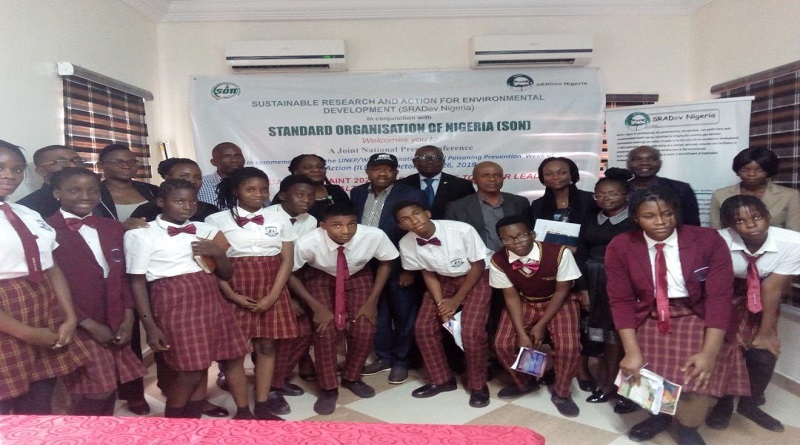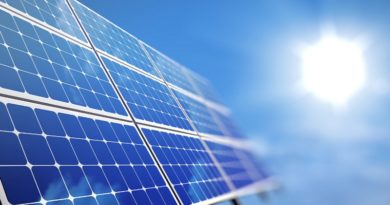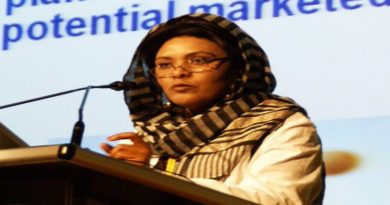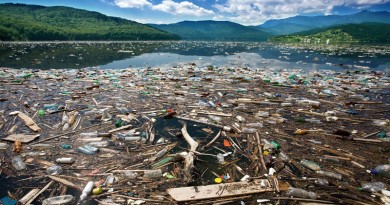SRADev-Nigeria calls for legislation to eliminate lead in paint
Picture caption: Group photograph of participants at the SRADev- Nigeria media conference held in Lagos on 5th November 2019.
Ahead of the global ban of use of lead in paint by the year 2020, the Sustainable Research and Action for Environmental Development (SRADev Nigeria) and its partners have called on the Federal Government of Nigeria through the National Environmental Standards and Regulation Enforcement Agency (NESREA) to immediately review and finalise the draft regulation to completely ban the manufacture, import, export, distribution, sale and use of paints that contain total lead concentrations exceeding 90 parts per million (ppm).
Executive Director of SRADev Nigeria, Dr. Leslie Adogame, who stated this at a joint fourth media conference to mark the International Lead Poisoning Prevention Week of Action (ILPPWA) held in Lagos last week in conjunction with Standards Organisation of Nigeria (SON), Paint Manufacturers Association of Nigeria (PMA) and NESREA added that state governments also needs to immediately put in place policy frameworks and regulatory mechanisms.
He added that the regulation should mandate paint companies to display enough information indicating harmful content on paint in labels and provide a warning on possible lead dust hazards when disturbing painted surfaces while importation of alternatives of lead compound should be tariffs and taxes free.
Dr. Adogame, whose organization is also the focal point for Heavy Metal Working Group (HMWG) also called on the paint companies especially the SMEs that still produce lead paints to expeditiously stop the use of leaded paint ingredients in paint formulations, stressing that those that have shifted to non-lead paint production should get their products certified through SON to increase the customer’s ability to choose paints with no added lead.
He explained that since the organization commenced the national campaign to eliminate lead, some progress is being made “Standard Organisation of Nigeria (SON) (NIS 269:2017) has set Lead paint standard at 90 ppm. But this standard is voluntary and needs to be backed by a regulation and enforced. NESREA has formulated a draft regulation to enforce lead paint limits at 90ppm. Also, the Federal Ministry of Industry, Trade and Investment (FMITI) has also produced a draft National Policy on Paint making in Nigeria. However, these policy instruments are yet to be finalised. Notwithstanding, we commend efforts of these government agencies and their resolve to eliminate lead paint by 2020.”
On why the world is moving to ban lead in paint by 2020, he said “Lead is added to most paint to improve its covering power and durability. Lead is used during the production stage as drying agent for preservation of paints. Unfortunately, lead is a powerful poison. Both inside and outside the home, deteriorated lead-paint mixes with household dust and soil. Children may become lead poisoned by: Putting their hands or other lead-contaminated objects into their mouths, eating paint chips found in homes with peeling or flaking lead-based paint, Kids eat peeling paint; it tastes like lemon drops or playing in lead-contaminated soil. Lead is more dangerous to children because: Children’s growing bodies absorb more lead and Children’s brains and nervous systems are more sensitive to the damaging effects of lead.
“Lead exposure is a well-known source of harm to children’s health that can cause adverse lifelong effects, such as decreased intelligence, poor school performance, mental retardation and violent behavior. Its exposure in childhood is now known to be associated with lower vocabulary and grammatical-reasoning scores, increased absenteeism, poorer eye-to-hand coordination, and lower class standing in high school. It is therefore important that sources of lead hazards such as lead paint and dust in children’s environment be identified and minimized, if not entirely and safely removed, to protect kids from such harm.”
On how to eliminate lead in paint, he said “unfortunately, even though there is wide recognition of this problem, which led to a number of bans of lead in paint across North America and Western Europe over the past 70 years, today paints from our latest study are fortified with added lead in Nigeria. This is an avoidable problem, and one with well-known and tested safer commercial substitutes. There are alternatives to lead as drying agent in paint production, and these are even more recognized by the Paint Manufacturers Association of Nigeria (PMA). Alternatives like strontium or zirconium, metallic zinc, cobalt, metallic calcium among others. Cleaner alternatives like Titanium dioxide have been known to be in use. Interestingly, it is known to require no change in technology to reformulate or substitute any of these in paint production.
“Significantly, the International Paint and Printers Ink Council (IPPIC), a body to which the Nigerian Paints Manufacturers are affiliated, formally adopted a resolution in 2008 that supports the restrictions on the use of lead in paints that are already in place and that recommends their widespread adoption by authorities in countries not currently regulating the use of lead in paint. IPPIC has participated in the GAELP Interim Advisory committee and has also engaged in regional paint industry associations on issues related to lead paint.
“National paint industry trade associations therefore needs to key into the growing international and regional processes and will not be able to ignore growing pressures on their member companies to discontinue the use of lead pigments, lead drying agents, and other added lead compounds in paints, since these pressures are expected to continue and are not likely to stop. It is expected therefore that SME sector associations be advised to take a number of actions including proactively discussing this issue among their members; encourage members to discontinue using lead compounds in their formulations; providing relevant technical and supply chain information to those members companies who may need it, and, eventually, being able to inform national government that their members have no objection to the adoption of a national lead paint control instrument.”
Dr. Adogame stressed that paint consumers should demand paints with no added lead from paint manufacturers and retailers, as well as full disclosure of a paint product’s lead content, adding that household and institutional consumers should ask for, consciously buy, and apply only paints with no added lead in places frequently used by children such as homes, schools, day care centers, parks and playgrounds.
He called on civil society and other non-governmental organizations, together with other professional groups to collaborate with government agencies to carry out awareness-raising campaigns to sensitise the public on the dangers associated with elevated lead levels in the blood, possible sources of lead exposure, and availability of possible technically superior and safer alternatives.
Representative of SON, Mrs. Mosunmola Sameul, said her organization has been on the issue of elimination of lead in paint for a very long time because of its negative effects on children and the environment. She explained that 90 ppm is the national position agreed on by all the parties involved in the country.
Executive Secretary of PMA, Mr. Jude Maduka, said 80 per cent of paint materials in the country are imported, adding that the association has being sensitizing its members to key into lead free paint manufacturing.
He went further, “lead content in Nigeria paints is 90 ppm while some are already producing lead free paint.”
The event themed, Ban lead paint 2020- Industry to reformulate to safer lead paint alternatives in Nigeria” was also attended by students and NGO’s working on chemicals management in the country.




